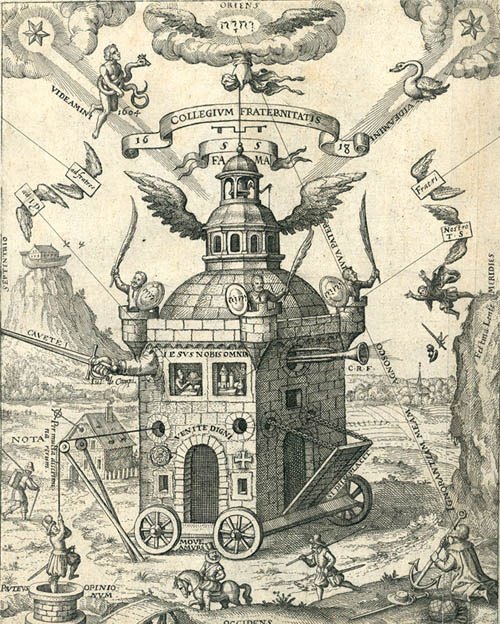Spiritual Regeneration
The study and practice of esotericism and gnosticism has the goal of the spiritual regeneration of the human being.
Esoteric traditions always develop within groups, whether as part of formal religions, mystery schools, orders, or societies. The esoteric process is individual and intimate, but cannot unfold properly without a master, a teaching, and a community. The gnostic teachings of Samael Aun Weor developed through the lineage of Western esotericism and into the various gnostic schools, centers, and organizations of the modern gnostic movement.
What these diverse groups have in common are the connection to Samael as the master, the gnostic doctrine of the three factors, and the groups that we work within.
Paradox of Light and Dark
Gnostic esotericism calls upon us to embrace paradox. On the psychological level we are Essence, which is divine light. Yet the light is trapped in the darkness of the ego, the legion of character defects, psychic aggregates, fractured shadows and shells. On the ontological level we are a small part of the Innermost Being that has become trapped and hypnotized in matter.
This is the path of the razor’s edge. To live and work within this paradox of light and darkness, and wisely use the light to overcome the dark.
In esoteric groups, schools, and societies we have the support of individuals who are also working in this same manner. We share a common vocabulary, common values, common goals. This is invaluable for the work, as we can gather together to study and practice and become much more than the sum of our parts, energetically and spiritually speaking.
Anyone who has had the opportunity to meditate in a group setting with experienced practitioners can attest to the power of group practice, and the ease with which one can go into deep states, when alone it may feel like a constant struggle.
Working Together
The paradox of working esoteric groups is that they are composed of imperfect people striving toward perfection. In struggling to liberate the light from our internal darkness we are confronted over and over with these egoic manifestations. We must wisely use the “psychological gymnasium” of an esoteric group to deepen our inner work.
What we judge in others is a mirror for the darkness we have within ourselves. We can use the opportunity to practice humility, honesty, and patience with our spiritual brothers and sisters in their imperfections, thereby multiplying our love for humanity.
Dion Fortune on Occult Societies
If we are active in a gnostic group or community it is necessary to understand some of their practicalities, benefits, and pitfalls. The great occultist and writer Dion Fortune (1890-1946) was an important contributor of esoteric wisdom and insight in this regard. Her books and writings cover numerous aspects of occultism but a few books stand out for this topic including Sane Occultism, The Training and Work of an Initiate, Esoteric Orders and their Work, and Psychic Self-Defense.
In Sane Occultism in particular, Fortune tackles thorny issues such as megalomania and delusions of grandeur, group karma, authority and obedience, prophecy, and psychic pathologies.
She is characteristically direct and forthright, not shying away from the realities of misuse of power within occultism that can result in great harm, intentional or not. This book is highly recommended reading for anyone interested in or currently working in an esoteric group. Some quotes from Sane Occultism by Dion Fortune:
On Occultism
“Natural science lays its evidence before the five physical senses possessed by every normal human being; occult science makes its appeal to the judgment of senses but rarely to be found developed in human beings.”
On Group Karma
“A initiate of the Western Tradition once said to me, ‘Two things are necessary for safety in occult work, right motives, and right associates’, and anyone who has had experience of practical occultism knows how true this is.”
On Battling Evil
“‘Be still and know that I am God’, is the attitude of power. It is a refusal to react that is the strongest armour. Unfailing compassion and unfaltering fidelity to the right will win any battle in the long run. Let us learn, in all times of difficulty and distress, to trust the Masters, to invoke the Divine Law, and to await its working.”
On Authority and Obedience
“The teacher who has a genuine system to communicate and who is really in touch with his Master and acting under His instructions can safely leave his pupil to the operation of the cosmic law. If he is right in his opinion that a certain course will prove unsatisfactory, and the pupil, disregarding his advice, pursues that course, the latter will not be long in finding out his mistake and will assess his teacher’s advice all the higher for this practical test of its wisdom, and be ready enough to give heed in the future. It is seldom that real loyalty is yielded till such a test has been made.
The demand for blind obedience as a proof of trust should be regarded with suspicion by the would-be pupil; the confidence trick is a very old one, and can be played on more than one plane. No one should demand faith without proof; if he has anything tangible to offer, he will be able to give satisfactory proofs and offer good and sufficient reasons that shall satisfy the judgment and bear investigation.
Early in my occult career I met a teacher who demanded blind faith as a proof of loyalty, and those things concerning which we were required to exercise faith turned out to be sordid irregularities. For that which is good, a good reason can be given, and that for which no good reason can be given generally turns out not to be good.”

